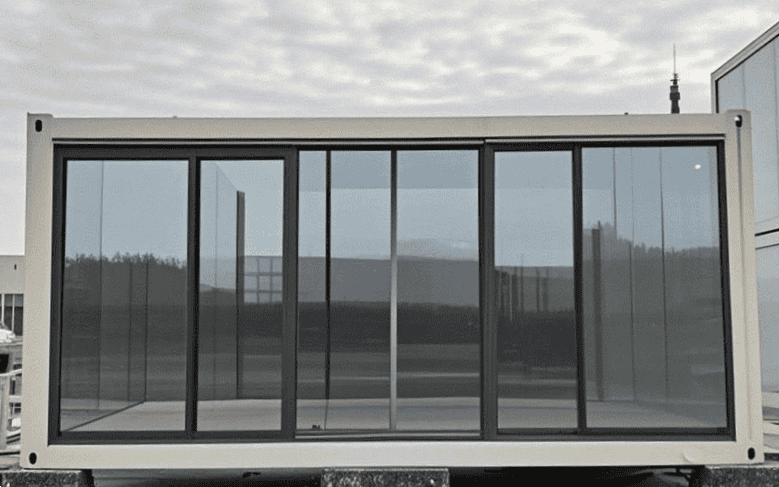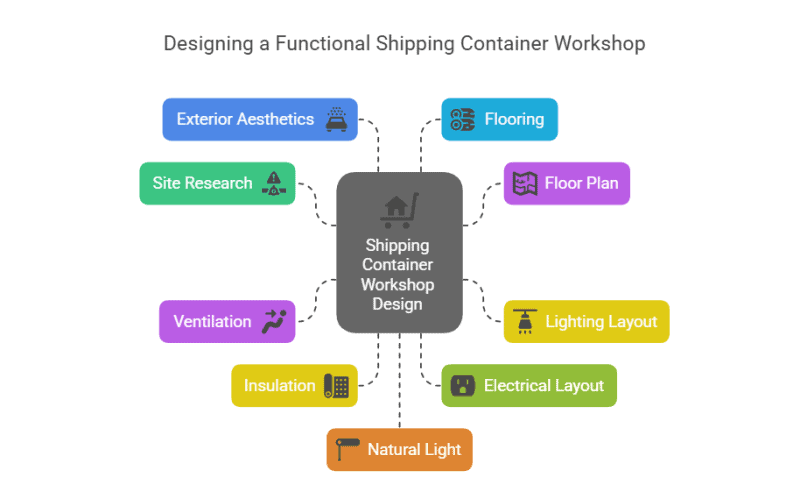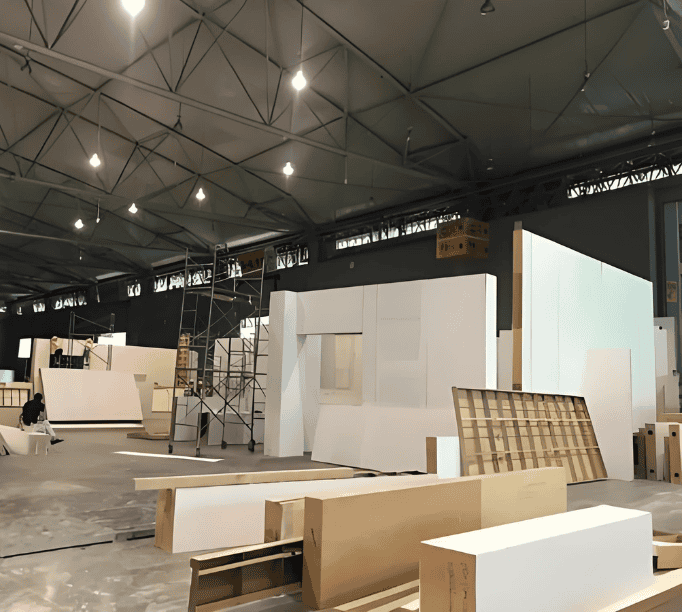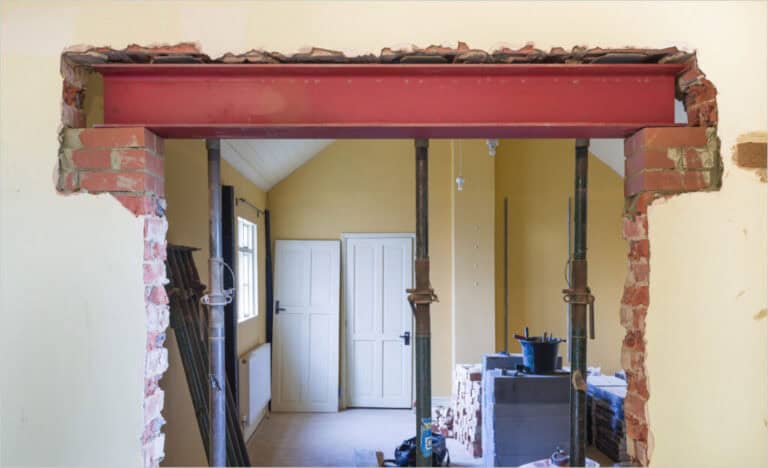Building a workshop can often feel like a daunting task—sky-high costs, long construction timelines, and the challenge of creating a space that truly fits your needs. But what if you could skip the usual headaches? Imagine a solution that’s quick, customizable, and budget-friendly—enter the world of shipping container workshops! These versatile spaces have become the go-to option for anyone seeking an innovative way to create a functional workspace.
As a prefabricated steel structure manufacturer, we’ve seen how transforming shipping containers into workshops opens up a world of possibilities. Whether you’re after something compact or need a larger, multi-functional area, we’ve got 10 inspiring shipping container workshop design concepts and creative ideas to help you get started. Let’s dive in!
What Is a Shipping Container Workshop?
A shipping container workshop is simply a 20-foot or 40-foot shipping container that’s been repurposed into a functional, customizable workspace. These containers are tough, weather-resistant, and quick to set up—making them perfect for just about any workshop you can imagine.

Whether you’re looking to create a small DIY studio or a larger industrial space, shipping container workshops offer endless possibilities. They’re cost-effective, easy to personalize, and great for the environment by reusing materials.
Shipping Container Workshop Space Types
When it comes to designing your shipping container workshop, the possibilities are endless. Whether you need something compact and efficient or spacious and flexible, each space type offers unique advantages to meet your specific needs.
Open-Concept Shipping Container Workshop
Want a spacious, flexible environment? Removing interior walls can create an open layout, giving you the freedom to design the workshop however you like. You could set up large workstations or dedicated zones for different tasks. Adding steel beams or other reinforcements will maintain the strength of the structure while keeping the design clean and airy. This setup works particularly well for creative spaces like art studios or woodshops, where flexibility and movement are key to productivity.
Modular Expandable Shipping Container Workshop
Linking multiple containers creates a scalable, modular space. Whether you need more room now or in the future, you can easily expand. A modular design allows you to add additional containers as your business grows. With steel connections and proper insulation, you ensure the structure is secure and well-temperature regulated, which is essential if you’re working with sensitive materials. This approach works well for businesses that foresee growth, like carpentry or metalworking shops.
Eco-Friendly Shipping Container Workshop
Transform your container into an eco-friendly workshop by integrating solar panels and a rainwater harvesting system. Not only does this reduce operating costs, but it also makes your workspace more self-sufficient. Using sustainable insulation materials like recycled denim or spray foam, and energy-efficient steel cladding will further enhance the eco-friendliness. Plus, a green workspace aligns with modern sustainability values while helping lower long-term utility bills.
Mobile Shipping Container Workshop on Wheels
A mobile workshop gives you the freedom to work anywhere. Reinforced steel frames and axle installation will ensure your container remains stable and durable while on the move. Whether you need to take your work to a job site or simply move to a new location, a mobile container workshop can easily adapt. Adding proper safety mechanisms like wheel locks or stabilizing jacks will also keep your structure secure no matter where you park it, ideal for contractors or on-the-go professionals.
Double-Height Shipping Container Workshop
Need more vertical space? Stacking containers vertically will give you plenty of room for high ceilings and multi-level work areas. This design requires steel supports to ensure stability, along with carefully considered stairs or ladders to provide easy access to the upper level. A multi-level workshop maximizes space without expanding its footprint, making it perfect for storage-heavy workshops, like automotive repair or mechanical work.
Workshop with Integrated Outdoor Work Area
If you need a space that expands beyond the container walls, consider incorporating fold-out steel doors or awnings to create an outdoor working area. These features make your workspace more versatile, whether you’re working with materials that require extra space or simply want to enjoy the fresh air. With durable steel hinges and locking mechanisms, you can safely open your container to create a seamless indoor-outdoor experience—ideal for woodworking or metal fabrication projects that require ventilation.
Climate-Controlled Shipping Container Workshop
A climate-controlled workshop is essential for certain types of work. Installing HVAC systems within the container ensures a comfortable work environment year-round. This is especially important if you’re working with temperature-sensitive materials like paint, electronics, or food storage. Enhancing the insulation with high-quality materials will keep your workshop comfortable no matter the weather. You’ll create a more energy-efficient space that minimizes heating and cooling costs.
Industrial-Style Shipping Container Workshop
If you’re aiming for an industrial aesthetic, consider keeping the steel elements exposed. This style embraces rugged finishes, steel beams, and a tough, utilitarian design. Exposed materials give the space a raw, modern feel while maintaining functionality. Whether it’s for a workshop or an art gallery, the natural steel texture can add character to your space and highlight its industrial charm. This design works particularly well in urban settings where style and function collide.
Smart-Tech Enabled Shipping Container Workshop
Incorporating smart technology can take your shipping container workshop to the next level. Think automated lighting that adjusts to the time of day or remote-controlled security systems that ensure your space is always safe. You can even set up a smart thermostat to control the temperature remotely. Just make sure the wiring and tech installations are properly embedded within the steel frame to ensure safety and prevent damage. Smart features will not only make your workshop more efficient but also add an extra layer of convenience.
Secure, Heavy-Duty Shipping Container Workshop
If security is your top concern, reinforce your containers with high-grade steel locks and heavy-duty doors. This design ensures durability and theft resistance, making it ideal for workshops that store expensive tools or sensitive equipment. Adding security cameras and motion sensors further strengthens the safety of the space. A secure workshop allows you to focus on your work without worrying about the safety of your materials, making it perfect for businesses that handle high-value items, like electronics repair or precious metalworking.
10 Shipping Container Workshop Design Concepts
Designing a shipping container workshop involves more than just stacking containers—it’s about creating a space that works for you. From site research to insulation, each design element plays a crucial role in making your workshop efficient, comfortable, and durable.

Conduct Thorough Site Research
Before you even start designing, make sure you research the site conditions—understand the weather patterns, local regulations, and space limitations. This ensures that your design accounts for any specific challenges, such as heavy winds or snow loads, that could impact your container workshop’s stability.
Create a Functional Floor Plan
Carefully map out your space to make the most of every square inch. Think about your workflow—where will tools, materials, and workstations go? Ensure that there’s easy access to equipment and clear pathways for movement, helping to avoid unnecessary clutter and inefficiency.
Design an Effective Lighting Layout
Lighting is key for any workshop, and shipping containers can sometimes feel dark or cramped. Plan for ambient, task, and accent lighting. Task lighting over workbenches is crucial for detailed tasks, while LED fixtures will keep things energy-efficient and long-lasting.
Incorporate Proper Ventilation
Good airflow is vital, especially in a metal container. Install exhaust fans or louvered vents to keep air circulating and prevent condensation, which can lead to rust. If you’re working with paint, chemicals, or wood, make sure to include proper ventilation to maintain a healthy environment.
Add Insulation for Comfort
For a comfortable working environment, insulation is a must—both for temperature control and noise reduction. You can opt for spray foam insulation for better air sealing, or rigid foam board for effective thermal insulation. Remember, a well-insulated container keeps energy costs down while maintaining a stable interior climate.
Not sure which insulation method is right for your climate or budget? Our guide on How to Insulate a Shipping Container Home breaks down the pros and cons of spray foam, rigid panels, and more.
Plan Electrical Layout Early On
Ensure your electrical wiring is planned before installing fixtures. Mark out where power outlets, switches, and lights will be placed. If you’re working with heavy equipment, make sure you have dedicated circuits to handle the load, preventing electrical overload.
Design for Exterior Aesthetics
The exterior of your container workshop is the first thing people see. Whether you’re going for a sleek, modern look or an industrial feel, choose materials that complement your style. Consider adding cladding or paint that suits your design while protecting the steel from rust.
Focus on Durable Flooring
For workshops that see heavy foot traffic or the use of heavy equipment, the floor needs to be tough. Use epoxy flooring or concrete slabs to ensure long-lasting durability. For areas that need additional insulation, consider rubber flooring to reduce noise and provide extra cushioning.
Maximize Natural Light
Incorporating large windows or skylights can bring in much-needed natural light, making the space feel more open and inviting. This can help reduce energy costs and create a more pleasant atmosphere. Be sure to position these windows in areas where they won’t compromise the security or insulation of the container.
Ensure Accessibility and Safety
Make sure your workshop is accessible and safe for everyone. Consider adding ramps or wide doors to accommodate equipment and provide easy access for individuals with mobility issues. Additionally, plan for fire exits and install fire-resistant materials in high-risk areas to comply with safety standards.
Creative Ideas for Different Shipping Container Workshops
Shipping containers aren’t just for general workshops—they can be tailored to meet specific needs. Here are a few ideas for specialized containers:
- Automotive Repair Workshops: Install reinforced flooring and ventilation systems to accommodate heavy machinery and ensure a safe working environment.
- Woodworking Studios: Add built-in dust collection and steel-framed tool storage to maintain organization and safety in a space that generates plenty of debris.
- Artisan Workshops: Design flexible interiors with movable steel shelving to create a dynamic, adaptable workspace that can evolve as your needs change.
- Metalworking Workshops: Use heat-resistant steel interiors and specialized ventilation systems to safely handle high temperatures and intense equipment.
- Home DIY Workshops: Optimize with compact storage solutions and integrated workbenches to keep your space organized and functional for personal projects.
Additional Ideas:
- Photography Studios: Incorporate adjustable lighting rigs and fold-out backgrounds to create a flexible environment that can adapt to different shoots.
- Gardening and Hydroponic Workshops: Set up smart irrigation systems and climate control to cultivate plants year-round, even in urban environments.
- Music Studios: Install soundproofing materials and acoustic panels to create an ideal space for recording or mixing music.
- Fitness Workshops: Equip with durable flooring and storage racks to keep your workout equipment organized and the space efficient.
Each of these types of workshops can be uniquely tailored to suit your needs, and as a prefabricated steel structure manufacturer, we’re here to help bring your vision to life with custom solutions that work for you.
Final Thoughts: Building Your Ideal Shipping Container Workshop
Designing a shipping container workshop may seem straightforward, but the reality is that there are many challenges along the way. From ensuring proper structural integrity to dealing with insulation, ventilation, and safety concerns, it’s easy to get lost in the details. That’s where we come in. Choosing a manufacturer who can design and build your workshop to your exact specifications ensures that you get exactly what you need, without the headaches.
As a steel structure container home manufacturer, we specialize in delivering customized, high-quality solutions that meet your specific requirements. We take care of everything—from the initial design to full fabrication—so all you have to do is move in, add your furniture, and get to work. With our expertise, you can be confident that your container workshop will be safe, functional, and ready for use as soon as it arrives.
Let’s bring your vision to life and create the perfect shipping container workshop for you!

